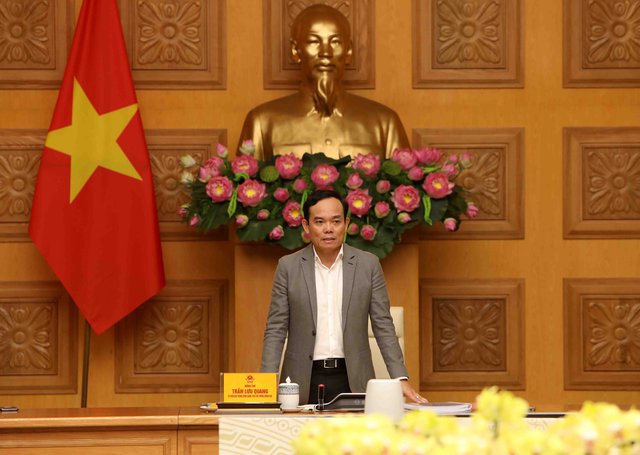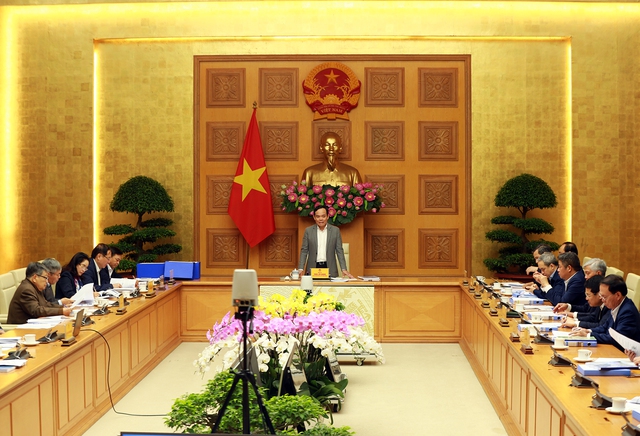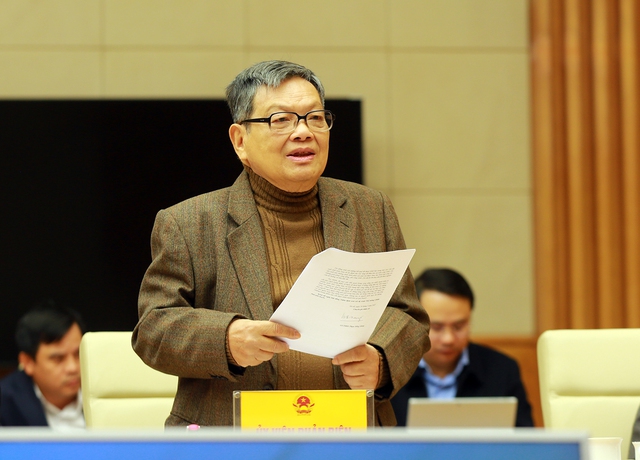
Deputy Prime Minister Tran Luu Quang chaired a meeting of the Appraisal Council for the planning for natural disaster prevention and control and irrigation for the period 2021-2030, with a vision to 2050.
According to the Summary Report on the Planning for Natural Disaster Prevention and Control and Irrigation for the period 2021-2030, with a vision to 2050 (Planning) of the Ministry of Agriculture and Rural Development, this is the first national sectoral master plan implemented in the field. natural disaster prevention and control and irrigation.
The planning aims to solve major existing problems in natural disaster prevention and control and irrigation at the national, inter-regional and inter-provincial nature; researched and proposed solutions for the medium-term (until 2030), long-term (until 2050) and beyond.
Some new highlights of the Master Plan compared to the past include: Calculating and updating forecasts on water sources and impacts of climate change; long-term forecasting of impacts of water resource exploitation activities, socio-economic development in upstream international and domestic river basins; inheriting scientific bases and research results of domestic and international organizations related to large and complex issues in each region.
The master plan also proposes major solutions, solving more thoroughly than before, such as works to overcome the problem of lowering water levels on large rivers, controlling water sources at estuaries, a system of connected structures, etc. Connecting water sources, transferring water and taking water far away, solutions for irrigating dry crops, especially in difficult and scarce areas...
The options proposed in the Master Plan are synchronized with the national master plan and other relevant sectoral plans; application of new technologies in planning calculation, and the ability to construct large works; investment capital needs.
Quy hoạch được phê duyệt sẽ là cơ sở để lập các quy hoạch có tính chất kỹ thuật, chuyên ngành trong lĩnh vực thuỷ lợi và phòng, chống thiên tai, quy hoạch chi tiết các lưu vực sông, vùng, địa phương.
Investment phase to implement the Master Plan
The Ministry of Agriculture and Rural Development expects the total cost of implementing the Master Plan to be about VND 471,000 billion for solutions for large and inter-provincial projects and about VND 203,000 billion for three programs (rural clean water supply, domestic and production water supply in the provinces). densely populated island; develop a system of small and scattered reservoirs to provide domestic water supply and irrigate shallow crops).
Funds are expected to be mobilized and arranged from the State budget capital, non-budget capital and other lawful capital sources..

The Deputy Prime Minister asked the Ministry of Agriculture and Rural Development to receive maximum comments to edit and perfect to have a "best possible" planning product.
The investment process is carried out in 3 phases, in which in the period of 2021-2025, investment is focused on major construction solutions, with an estimated total investment capital of about VND 50,000 billion.
During this period, it will focus on building new water reservoirs; increase the existing reservoir capacity; to build a number of systems to connect and transfer water within and between regions, to bring water to coastal areas for multi-purpose water supply, to irrigate crops of high economic value; research and construction of works to overcome and lower the water level on the main stream, works to prevent and combat flash floods and landslides.
Implement the program to upgrade the river and sea dyke systems; to build works to correct and prevent riverbank and coastal erosion, to protect important urban centers and residential areas, and to protect the territory; rural water supply program, water supply on densely populated islands.
In the 2026-2030 period, focus will be on implementing non-structural solutions, with a capital need of about 112,500 billion VND to continue to build and upgrade reservoirs, dams, water connection works, and water transfer projects. water.
Continue to implement the program to upgrade river and sea dyke systems; to build works to correct and prevent riverbank and coastal erosion to protect urban centers and residential areas; upgrade and modernize the management, exploitation and operation of irrigation systems...
In the period 2031-2050, it needs about VND 308,500 billion to research and build dams on the main stream, regulation works at the mouths of major rivers in the Central Coast and Mekong Delta; at the same time, continue to implement non-structural solutions and implement the remaining works of the planning on the basis of considering the location and scale suitable to reality.
Clearly define the order of investment priorities, the ability to allocate and mobilize resources
Discussing and commenting on the draft Master Plan, members of the Planning Documents Evaluation Council implemented by the consulting consortium of the Institute of Irrigation Planning and the Southern Institute of Irrigation Planning, under the chairmanship of the Department of Planning and Investment. Irrigation and the management of the Ministry of Agriculture and Rural Development have included all items in accordance with the provisions of the Law on Planning.
The planning products have a clear presentation form, fully express the contents of research, calculation, planning and meet the set requirements.
Prof. TSKH. Pham Hong Giang, Vice Chairman of the Vietnam Construction General Association, said that this draft master plan inherits the survey and analysis results from decades ago, and adds and synthesizes the results. latest observations.
The draft master plan has also researched, updated and analyzed the selection of construction solutions from many development scenarios, giving at least 2-3 options for each project solution, thereby proposing solutions. It is large, has a full scientific basis, is suitable for practice, has the highest feasibility in the regions.

Prof. Dr. Pham Hong Giang said that the draft Master Plan needs to have a clearer perspective and roadmap for current outstanding issues in the Red River Delta, the Central region, and the Mekong Delta.
Prof. Dr. Tang Duc Thang assessed that the planning approach is comprehensive, multi-sectoral and comprehensive; clear and coherent content for each region and river basin. In particular, the element of climate change, which is happening rapidly and strongly, has been incorporated in the Master Plan.
Prof. Dr. Pham Hong Giang said that the draft Master Plan needs to have a clearer perspective and roadmap for current outstanding issues in the Red River Delta, the Central region, and the Mekong Delta.
In the Mekong Delta, it is necessary to anticipate extreme scenarios in order to calculate the need, scale of construction research and investment roadmap, and ensure the effectiveness of large-scale water control and regulation works. This area is facing the risk of depletion of fresh water resources, which is increasingly severe in the dry season, Mr. Pham Hong Giang gives an example.
Prof. Dr. Dao Xuan Hoc suggested that the master plan should focus on dealing with major challenges, such as lowering the water level in the Red River, making it difficult to get water into irrigation systems from this river; or the problem of sea level rise and land subsidence in the Mekong Delta.
In order to ensure the feasibility after the planning is approved, the representative of the Ministry of Finance said that the plan should clearly state the list of works/projects invested by the central/local budget; Which projects need to mobilize social capital?
Agreeing with the opinion of the Ministry of Finance, the representative of the Ministry of Planning and Investment proposed to clarify the order of priority for investment in works and projects in accordance with the ability to allocate and mobilize capital for socialization.
Also related to the above content, the representative of MONRE said that mobilizing social capital for natural disaster prevention and control is very difficult. However, due to limited State resources, it is necessary to identify the work items capable of mobilizing capital for socialization.
The representative of the Ministry of Information and Communications emphasized the need to have a database in disaster prevention and control and irrigation that is fully updated, in real time to serve the state management and quick policy response. effective because this is an inter-regional and inter-provincial field.
After listening to the comments, Deputy Minister of Agriculture and Rural Development Nguyen Hoang Hiep affirmed that the Ministry of Agriculture and Rural Development will fully and seriously absorb comments and criticisms to soon complete the draft Master Plan.
The planning will be completed in the direction of better identifying the challenges to be faced; focus on solving problems of space and time (in which space must be at least the region, and time must be further); further update the hydrometeorological parameters and data; increase the application of technology solutions.
The planning will also be completed in the direction of providing general solutions, but with clear priorities, clear investment capital sources, first of all to solve the most pressing problems of each region and locality such as raising the water level. Red river water, dealing with saltwater-fresh water problems in the Mekong Delta, or upgrading the central reservoir system to reduce floods...